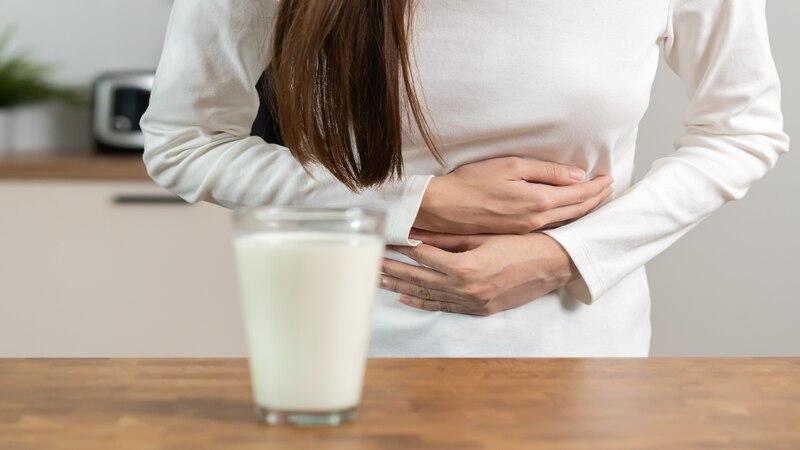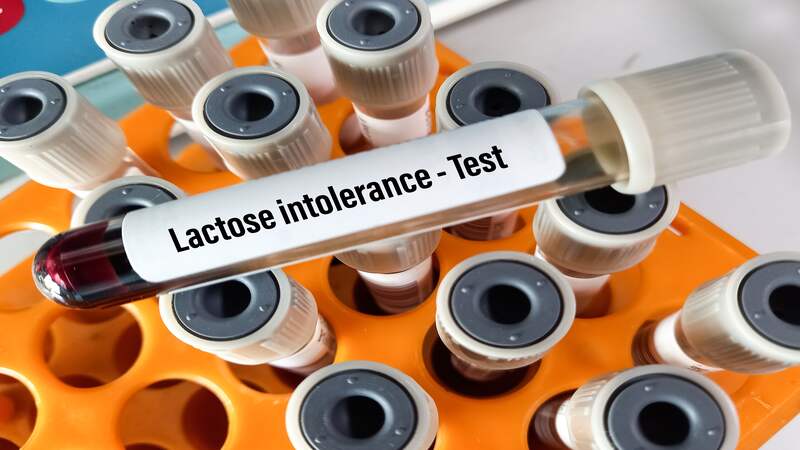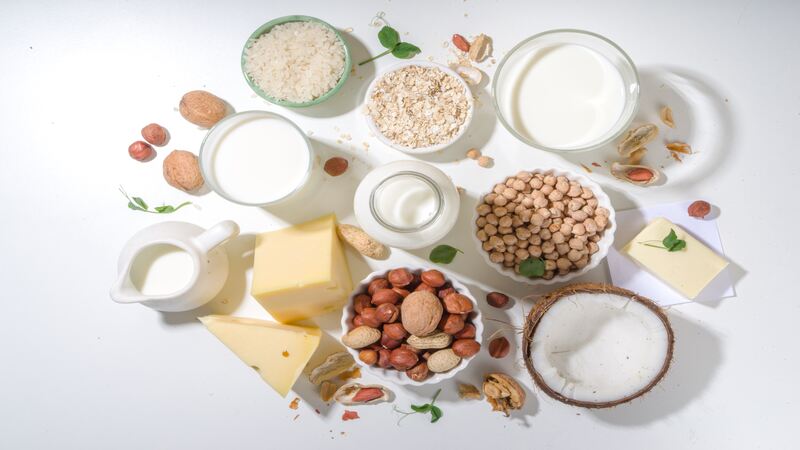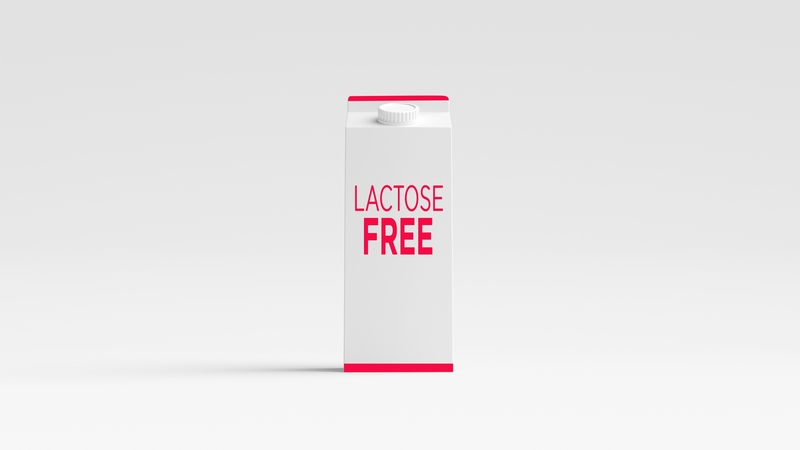 Calcium plays a crucial role in pregnancy by supporting optimal fetal growth and development. While milk is a primary source of calcium, individuals with lactose intolerance may need to explore alternative dietary sources to meet their daily calcium needs. Lactose intolerance during pregnancy can be complex due to hormonal changes and their impact on the digestive system.
Calcium plays a crucial role in pregnancy by supporting optimal fetal growth and development. While milk is a primary source of calcium, individuals with lactose intolerance may need to explore alternative dietary sources to meet their daily calcium needs. Lactose intolerance during pregnancy can be complex due to hormonal changes and their impact on the digestive system.
In some cases, general symptoms during pregnancy are most similar to lactose intolerance as nausea, vomiting, and cramping are the common side effects of pregnancy too. Hence, Understanding the causes, symptoms, and treatments of lactose intolerance in pregnancy is important for effectively managing this condition.
What Is Lactose Intolerance During Pregnancy?
During the 3rd trimester, the ability to digest lactose increases leading to lactose intolerance for some women. This condition, caused by a deficiency of the enzyme lactase in the small intestine, can result in bloating or diarrhea after consuming products containing lactose (1). Despite the inconvenience, most individuals with this condition can still manage without needing to eliminate lactose from their diets, which is reassuring for pregnant women who need to obtain calcium from dairy products for their increased nutritional needs. (2)
Signs And Symptoms Of Lactose Intolerance During Pregnancy

The signs of lactose intolerance closely resemble general pregnancy symptoms, with abdominal pain, bloating, cramping, and gas occurring 30 minutes to two hours after ingesting dairy products (3). Typical symptoms include:
- Bloating
- Diarrhea (4)
- Abdominal Cramps
- Flatulence (5)
- Borborygmi – rumbling sound during digestion (6)
Tests For Lactose Intolerance During Pregnancy?

If you regularly encounter abdominal discomfort, bloating, and gas following consumption of dairy products—but experience relief after eliminating dairy from your diet—you likely have lactose intolerance.
The diagnosis can be confirmed by different tests which follow:
a) Hydrogen-Breath Test
Health professionals utilize this test to identify lactose malabsorption and intolerance. Upon consuming a liquid containing lactose, your breath will be analyzed every 30 minutes over a few hours to measure hydrogen levels (7). If hydrogen levels and symptoms both increase during the test, the diagnosis of lactose intolerance may be considered.
b) Blood Test
This will assess the concentration of glucose in your blood sample before and after consuming lactose-containing liquid (8).
c) Stool Acidity Test
The stool acidity test for lactose intolerance evaluates the pH level of a stool sample, with low pH levels indicating high acidity. While a low-pH stool test result may indicate carbohydrate malabsorption, it is not exclusive to lactose intolerance.
How Common Is Lactose Intolerance?

Lactose intolerance is more prevalent in individuals of African American, American Indian, Asian American, and Hispanic/Latino descent due to higher rates of lactose malabsorption within these ethnic groups. Conversely, European individuals are the least likely to experience lactose intolerance (9).
How Did I Get Lactose Intolerance?

Pregnant women with lactose intolerance may have difficulty digesting lactose, a milk-based sugar due to a deficiency of the enzyme lactase in the small intestine (10). However, gestational mothers with this complication can still consume dairy products like cheese or yogurt as these products undergo fermentation processes that break down much of the lactose in milk.
Certain hidden sources of Lactose are (11):
- Food items like mixed vegetables, paneer dishes, and others
- Bread and other baked goods
- Margarine
- Salad dressings
- Candies and some snack foods
- Pancake, biscuit, and cookie mixes
- Processed meats
- Creamy soups
- Chocolate candies, prepared cakes, and sweet rolls
- Powdered coffee creamers
- Hot chocolate mix
- Imitation dairy products
- Party dips
- Cream liquors
- Sauces and gravies
Will Lactose Intolerance Affect My Baby?
You do not need to consume milk for a healthy baby, but ensuring adequate calcium intake is important. It’s crucial to recognize that the baby will be unaffected by low calcium intake, as your body will draw calcium from your bones and teeth to support the baby’s growth. However, this can lead to severe long-term consequences for your health, including osteoporosis.
How Can You Get Enough Calcium During Pregnancy?

Pregnant women should aim for a daily calcium intake of 1200 mg as per Indian Dietary Allowances 2024 as insufficient calcium consumption can result in adverse effects for both the mother and the fetus. If lactose intolerant, it’s important to make wise food choices to meet these requirements (12).
Table 1: Calcium content in Indian Foods (13)
| Food sources | Serving size | Calcium (mg) |
| Curd | 1 katori | 149 |
| Cheese slice | 20 grams | 158 |
| Chapati (whole wheat) | 1 (25 grams) | 12 |
| White Bread | 1 slice | 30 |
| Ragi | 25 grams | 75 |
| Rajma | 1 katori (25 grams) | 65 |
| Soyabean | 1 katori (25 grams) | 60 |
| Kaale chane (Whole Bengal Gram) | 1 katori (25 grams) | 72 |
| Urad Dal (Black gram Dal) | 25 grams | 50 |
| Palak (Spinach) | 1 katori | 73 |
| Beetroot | 25 grams | 50 |
| Methi (Fenugreek leaves, fresh) | 1 katori | 395 |
| Chaulai | 1 katori | 397 |
| Beans | 1 katori | 90 |
| Bathua | 1 katori | 150 |
| Sarso (Mustard Leaves) | 1 katori | 155 |
| Bhendi/Okra (Lady’s finger) | ½ katori | 65 |
| Almonds | 25 grams (1 handful) | 58 |
| Cashewnut | 25 grams (1 handful) | 13 |
| Dried Figs | 5 whole | 95 |
| Sesame Seeds/ Gingelly seeds (Til) | 25 grams (1 tablespoon) | 363 |
| Orange | 1 medium sized | 50 |
| Hilsa Fish | 25 grams | 45 |
| Rohu Fish | 25 grams | 160 |
How To Treat Lactose Intolerance During Pregnancy Naturally
Lactose intolerance can be effectively managed by dietary modifications via incorporating alternative food sources into your diet to meet the nutritional requirements of both. The positive aspect is that dietary challenges related to lactose intolerance can be effectively navigated during this crucial time (14).
a) Diet
Consider incorporating various foods into your diet. Foods such as salmon, almonds, kale, broccoli, okra, sardines, and pinto beans are rich in calcium. Focus on taking around 1,000mg of calcium. While there are limited natural sources of vitamin D, eggs can serve as a good option. Moderate sun exposure is also beneficial but avoid prolonged direct sunlight exposure.
b) Fortified products
Food products like bread and orange juice are fortified to provide vitamin D and calcium. Opt for lactose-free or lactose-reduced dairy products as well (15).
c) Multivitamins
Taking a prenatal vitamin is important to support fetal development. Ensure that the prenatal vitamin includes calcium and vitamin D. Alternatively, you can supplement your prenatal vitamin with separate calcium and vitamin D supplements. Talk to a healthcare professional about this.
Lactose intolerance during pregnancy creates uncomfortable situations for both and hence involves dietary changes to ensure that both get essential nutrients without symptoms. This includes reducing dairy, consuming it with meals, choosing lactose-free options, adding yogurt and non-dairy sources of calcium, and discussing enzyme supplements with your doctor. Check food labels for lactose (16).
FAQ’s
1. Can You Be Lactose Intolerant While Pregnant?
During pregnancy, many women experience an increase in lactose digestion, particularly in the third trimester, often resulting in lactose intolerance. Despite this, pregnant women can consume other dairy products in moderation without issues.
2. Why Does Milk Give Me Diarrhea While Pregnant?
The reduced activity of the lactase enzyme in the small intestine during pregnancy can lead to incomplete milk digestion, causing lactose malabsorption and resulting in symptoms such as bloating, gas, abdominal cramps, and diarrhea.
3. Why Am I Suddenly Lactose Intolerant?
The diminished functioning of the lactase enzyme in the small intestine during pregnancy (specifically in the 3rd trimester) results in inadequate absorption of milk and leads to symptoms of lactose intolerance like bloating, gas, abdominal cramps, and diarrhea.
4. Are Lactose Pills Safe During Pregnancy?
As per FDA regulations, Lactase pills are not considered safe during pregnancy. However, you can ask the doctor for other safe medicines such as Lactaid
References
- American Pregnancy Association, Treating Lactose Intolerance During Pregnancy – https://americanpregnancy.org/healthy-pregnancy/pregnancy-health-wellness/lactose-intolerance-during-pregnancy/
- Villar J, Kestler E, Castillo P, Juarez A, Menendez R, Solomons NW. Improved lactose digestion during pregnancy: a case of physiologic adaptation? Obstet Gynecol. 1988 May – https://pubmed.ncbi.nlm.nih.gov/3357657/
- Todd H. Baron, Belinda Ramirez, Joel E. Richter. Gastrointestinal Motility Disorders during Pregnancy. Ann Intern Med.1993;118:366-375 – https://www.acpjournals.org/doi/abs/10.7326/0003-4819-118-5-199303010-00008
- Jutta Keller, Dorothea Frederking & Peter Layer Nature Clinical Practice Gastroenterology & Hepatology volume 5, pages430–443 (2008) – https://www.nature.com/articles/ncpgasthep1197
- American Pregnancy Association- Gas During Pregnancy – https://americanpregnancy.org/healthy-pregnancy/pregnancy-health-wellness/gas-during-pregnancy/
- Harold Ellis, BORBORYGMI, Editor(s): F. Dudley Hart, French’s Index of Differential Diagnosis (Eleventh Edition),Butterworth-Heinemann, 1979,Page 111 – https://www.sciencedirect.com/science/article/abs/pii/B9780723604907500343
- Alexander Eisenmann, Anton Amann, Michael Said, Bettina Datta and Maximilian Ledochowski epartment of Clinical Nutrition, Medical Hospital of Innsbruck, Austria Department of Anesthesia and General Intensive Care, Medical University of Innsbruck, Austria – https://www.researchgate.net/publication/231045321
- Talia F. Malik; Kiran K. Panuganti. Chicago Medical School at Rosalind Franklin University of Medicine and Science, Texas health Presbyterian, Denton – https://www.ncbi.nlm.nih.gov/books/NBK532285/
- P. Jellema, F.G. Schellevis, D.A.W.M. van der Windt, C.M.F. Kneepkens, H.E. van der Horst QJM: An International Journal of Medicine, Volume 103, Issue 8, August 2010, Pages 555 – https://academic.oup.com/qjmed/article/103/8/555/1523899
- Shafi, Azra; Husain, Qayyum. (2022). Intolerance to Milk Lactose, Diagnostic Tests and Dietary Management: A Recent Update. Avicenna Journal of Medical Biotechnology. 10. 10.34172/ajmb.2022.10. – https://www.researchgate.net/publication/361719687
- Facioni, M.S., Raspini, B., Pivari, F. et al. Nutritional management of lactose intolerance: the importance of diet and food labelling. J Transl Med 18, 260 (2020) – https://link.springer.com/article/10.1186/s12967-020-02429-2
- Gregory D. Miller National Dairy Council, Rosemont, Illinois (G.D.M., J.K.J.) Correspondence gregorymrosedmi.com, PhD, FACN,Judith K. Jarvis , MS, RD, LD &Lois D. McBean , MS, RD – https://www.tandfonline.com/doi/abs/10.1080/07315724.2001.10719029
- Singh, Meeta & Harinarayan, CV & Marwah, Raman & Sahay, Rakesh & Kalra, Sanjay & Babhulkar, Sushrut. (2020). Clinical Practice Guidelines on Postmenopausal Osteoporosis: *An Executive Summary and Recommendations – Update 2019-2020 – https://www.researchgate.net/publication/343673116
- Maria Sole Facioni, Benedetta Raspini, Francesca Pivari, Elena Dogliotti & Hellas Cena Journal of Translational Medicin – https://translational-medicine.biomedcentral.com/articles/10.1186/s12967-020-02429-2
- Swagerty DL Jr, Walling AD, Klein RM. Lactose intolerance. Am Fam Physician. 2002 May – https://www.aafp.org/pubs/afp/issues/2002/0501/p1845.html
- InformedHealth.org [Internet]. Cologne, Germany: Institute for Quality and Efficiency in Health Care (IQWiG); 2006 – https://www.ncbi.nlm.nih.gov/books/NBK310258/

